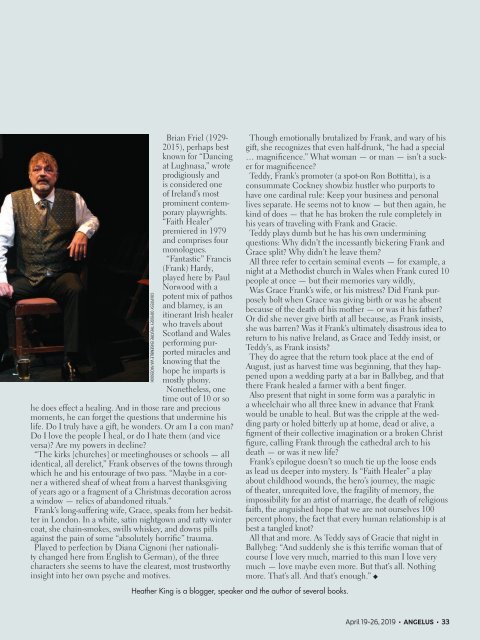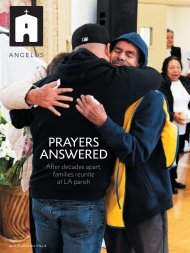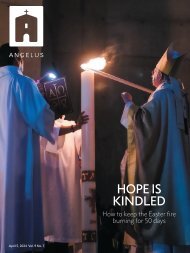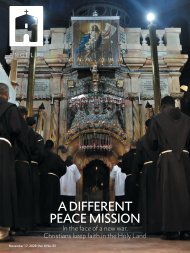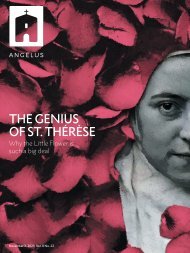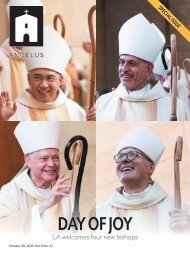Angelus News | April 19-26, 2019 | Vol. 4 No. 15
People hold candles during the Easter Vigil service at Westminster Cathedral on April 4, 2015, in London, England. Also known as the Paschal Vigil, the nocturnal liturgy celebrating the victory of Jesus Christ over death was for early Christians a night full of anticipation and dramatic symbols, rites, and singing. On page 10, contributing editor Mike Aquilina takes us back to the experience of the primitive Church to understand why the vigil was “the night of nights” for those Christians — and why it should still be for us, too. On page 16, Caitlin Yoshiko Kandil speaks to local catechumens about their road to conversion and why they’re looking forward to the “new life” of the baptism they’ll receive at this year’s Easter Vigil.
People hold candles during the Easter Vigil service at Westminster Cathedral on April 4, 2015, in London, England. Also known as the Paschal Vigil, the nocturnal liturgy celebrating the victory of Jesus Christ over death was for early Christians a night full of anticipation and dramatic symbols, rites, and singing. On page 10, contributing editor Mike Aquilina takes us back to the experience of the primitive Church to understand why the vigil was “the night of nights” for those Christians — and why it should still be for us, too. On page 16, Caitlin Yoshiko Kandil speaks to local catechumens about their road to conversion and why they’re looking forward to the “new life” of the baptism they’ll receive at this year’s Easter Vigil.
You also want an ePaper? Increase the reach of your titles
YUMPU automatically turns print PDFs into web optimized ePapers that Google loves.
Brian Friel (<strong>19</strong>29-<br />
20<strong>15</strong>), perhaps best<br />
known for “Dancing<br />
at Lughnasa,” wrote<br />
prodigiously and<br />
is considered one<br />
of Ireland’s most<br />
prominent contemporary<br />
playwrights.<br />
“Faith Healer”<br />
premiered in <strong>19</strong>79<br />
and comprises four<br />
monologues.<br />
“Fantastic” Francis<br />
(Frank) Hardy,<br />
played here by Paul<br />
<strong>No</strong>rwood with a<br />
potent mix of pathos<br />
and blarney, is an<br />
itinerant Irish healer<br />
who travels about<br />
Scotland and Wales<br />
performing purported<br />
miracles and<br />
knowing that the<br />
hope he imparts is<br />
mostly phony.<br />
<strong>No</strong>netheless, one<br />
time out of 10 or so<br />
he does effect a healing. And in those rare and precious<br />
moments, he can forget the questions that undermine his<br />
life. Do I truly have a gift, he wonders. Or am I a con man?<br />
Do I love the people I heal, or do I hate them (and vice<br />
versa)? Are my powers in decline?<br />
“The kirks [churches] or meetinghouses or schools — all<br />
identical, all derelict,” Frank observes of the towns through<br />
which he and his entourage of two pass. “Maybe in a corner<br />
a withered sheaf of wheat from a harvest thanksgiving<br />
of years ago or a fragment of a Christmas decoration across<br />
a window — relics of abandoned rituals.”<br />
Frank’s long-suffering wife, Grace, speaks from her bedsitter<br />
in London. In a white, satin nightgown and ratty winter<br />
coat, she chain-smokes, swills whiskey, and downs pills<br />
against the pain of some “absolutely horrific” trauma.<br />
Played to perfection by Diana Cignoni (her nationality<br />
changed here from English to German), of the three<br />
characters she seems to have the clearest, most trustworthy<br />
insight into her own psyche and motives.<br />
COURTESY ODYSSEY THEATRE ENSEMBLE VIA FACEBOOK<br />
Though emotionally brutalized by Frank, and wary of his<br />
gift, she recognizes that even half-drunk, “he had a special<br />
… magnificence.” What woman — or man — isn’t a sucker<br />
for magnificence?<br />
Teddy, Frank’s promoter (a spot-on Ron Bottitta), is a<br />
consummate Cockney showbiz hustler who purports to<br />
have one cardinal rule: Keep your business and personal<br />
lives separate. He seems not to know — but then again, he<br />
kind of does — that he has broken the rule completely in<br />
his years of traveling with Frank and Gracie.<br />
Teddy plays dumb but he has his own undermining<br />
questions: Why didn’t the incessantly bickering Frank and<br />
Grace split? Why didn’t he leave them?<br />
All three refer to certain seminal events — for example, a<br />
night at a Methodist church in Wales when Frank cured 10<br />
people at once — but their memories vary wildly,<br />
Was Grace Frank’s wife, or his mistress? Did Frank purposely<br />
bolt when Grace was giving birth or was he absent<br />
because of the death of his mother — or was it his father?<br />
Or did she never give birth at all because, as Frank insists,<br />
she was barren? Was it Frank’s ultimately disastrous idea to<br />
return to his native Ireland, as Grace and Teddy insist, or<br />
Teddy’s, as Frank insists?<br />
They do agree that the return took place at the end of<br />
August, just as harvest time was beginning, that they happened<br />
upon a wedding party at a bar in Ballybeg, and that<br />
there Frank healed a farmer with a bent finger.<br />
Also present that night in some form was a paralytic in<br />
a wheelchair who all three knew in advance that Frank<br />
would be unable to heal. But was the cripple at the wedding<br />
party or holed bitterly up at home, dead or alive, a<br />
figment of their collective imagination or a broken Christ<br />
figure, calling Frank through the cathedral arch to his<br />
death — or was it new life?<br />
Frank’s epilogue doesn’t so much tie up the loose ends<br />
as lead us deeper into mystery. Is “Faith Healer” a play<br />
about childhood wounds, the hero’s journey, the magic<br />
of theater, unrequited love, the fragility of memory, the<br />
impossibility for an artist of marriage, the death of religious<br />
faith, the anguished hope that we are not ourselves 100<br />
percent phony, the fact that every human relationship is at<br />
best a tangled knot?<br />
All that and more. As Teddy says of Gracie that night in<br />
Ballybeg: “And suddenly she is this terrific woman that of<br />
course I love very much, married to this man I love very<br />
much — love maybe even more. But that’s all. <strong>No</strong>thing<br />
more. That’s all. And that’s enough.” <br />
Heather King is a blogger, speaker and the author of several books.<br />
<strong>April</strong> <strong>19</strong>-<strong>26</strong>, 20<strong>19</strong> • ANGELUS • 33


